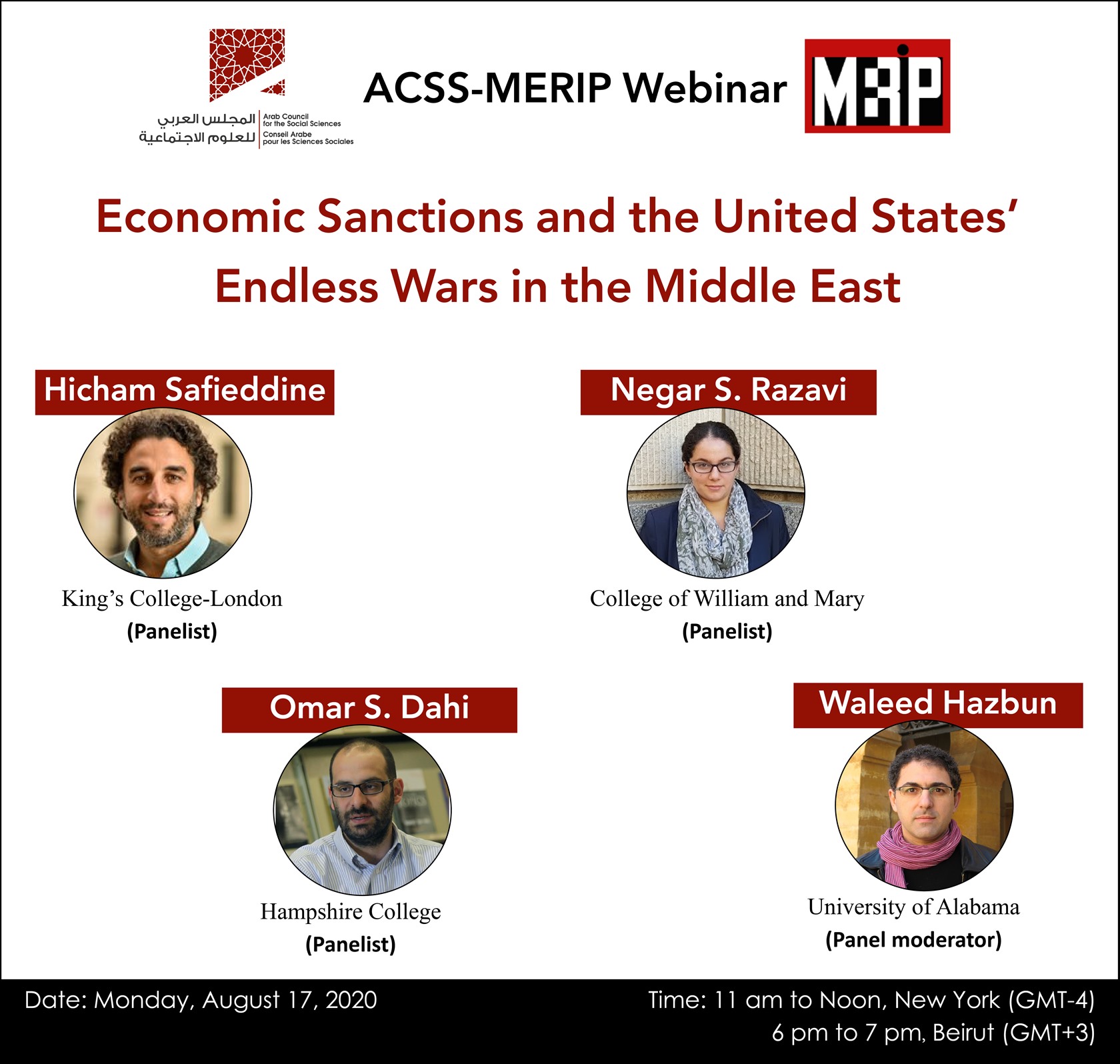
Economic Sanctions and the United States’ Endless Wars in the Middle East
Date: Monday, August 17, 2020
Time: 11am to Noon, New York (GMT-4) ; 6pm to 7pm Beirut (GMT+3)
Is the US use of economic sanctions a means to continue its endless wars in the Middle East?
The Arab Council for the Social Sciences (ACSS) Working Group on Critical Security Studies in the Arab Region and the Middle East Research and Information Project (MERIP), publishers of Middle East Report, are pleased to invite you to a webinar on “Economic Sanctions and the United States’ Endless Wars in the Middle East.” This webinar brings together contributors to a recent issue of Middle East Report (No. 294) “Exit Empire--Imagining New Paths for US Policy” and scholars affiliated with the ACSS’s project on Critical Security Studies in the Arab Region to discuss the use of economic sanctions as a coercive tool in United States policy towards the Middle East.
Discussion topics:
Hicham Safieddine (King's College-London) will explain how the nature of the international financial system allows the US to use sanctions as a tool for “financial warfare” and will delve into their ongoing impact on Lebanon in the midst of economic crisis.
Negar S. Razavi (College of William and Mary) will take us into the policy debates in Washington to explore what’s driving the endless expansion of sanctions against Iran and their impacts.
Omar S. Dahi (Hampshire College) will discuss the politics of US and European sanctions on Syria including the likely impact of the Caesar Act sanctions, including viewing them through the wider prism of conflict economies in Syria.
The webinar will be moderated by Waleed Hazbun (University of Alabama), co-editor of the Middle East Report’s “Exit Empire” issue and a founding member of the ACSS Working Group on Critical Security Studies.
Background reading:
Hicham Safieddine, "Consequences of US Financial Warfare in the Middle East," Middle East Report No. 294 (Spring 2020)
Negar S. Razavi and others, "Rethinking US Policy Toward Iran: A Forum," Middle East Report No. 294 (Spring 2020)
Omar Dahi, Conflict Economies in Syria: Roots, Dynamics, and Pathways for Change (Syrian Center for Policy Research, 2020)
See also:
Joy Gordon, "The Enduring Lessons of the Iraq Sanctions," Middle East Report No. 294 (Spring 2020) and the full “Exit Empire” issue, https://merip.org/magazine/294/
Samer Abboud, Omar S. Dahi, Waleed Hazbun, Nicole Sunday Grove, Coralie Pison Hindawi, Jamil Mouawad & Sami Hermez, “Towards a Beirut School of Critical Security Studies,” Critical Studies on Security, 6:3 (2018): 273-295
Biographies of panelists:
Hicham Safieddine is lecturer in the History of the Modern Middle East at King's College, University of London and the author of Banking on the State: The Financial Foundations of Lebanon (Stanford University Press, 2019).
Negar S. Razavi is Visiting Assistant Professor in the Department of Anthropology at the College of William and Mary and her publications include “The Systemic Problem of ‘Iran Expertise’ in Washington.”
Follow her on Twitter: @razaraz
Omar S. Dahi is Associate Professor of Economics at Hampshire College and co-director of the ACSS Working Group on Critical Security Studies in the Arab Region.
Follow him on Twitter: @omardahi
Waleed Hazbun (moderator) is Richard L. Chambers Professor in Middle Eastern studies in the Department of Political Science at The University of Alabama.
Follow him on Twitter: @Waleed_Hazbun
To submit your questions to the panelists, contact us on: chammaa@theacss.org before August 14, 2020 with the subject line: “Webinar: Economic Sanctions and the United States’ Endless Wars in the Middle East”
To register:
The webinar will be hosted on zoom. Please register via the following link:
https://us02web.zoom.us/webinar/register/WN_YyF7-1nAQeysvA6k_NXF5g
After registering, you will receive a confirmation email containing information about joining the webinar.
The webinar will be hosted in English (simultaneous interpretation to Arabic will be available for those who register on Zoom), and will be streamed live on the ACSS Facebook page: https://www.facebook.com/theacss
